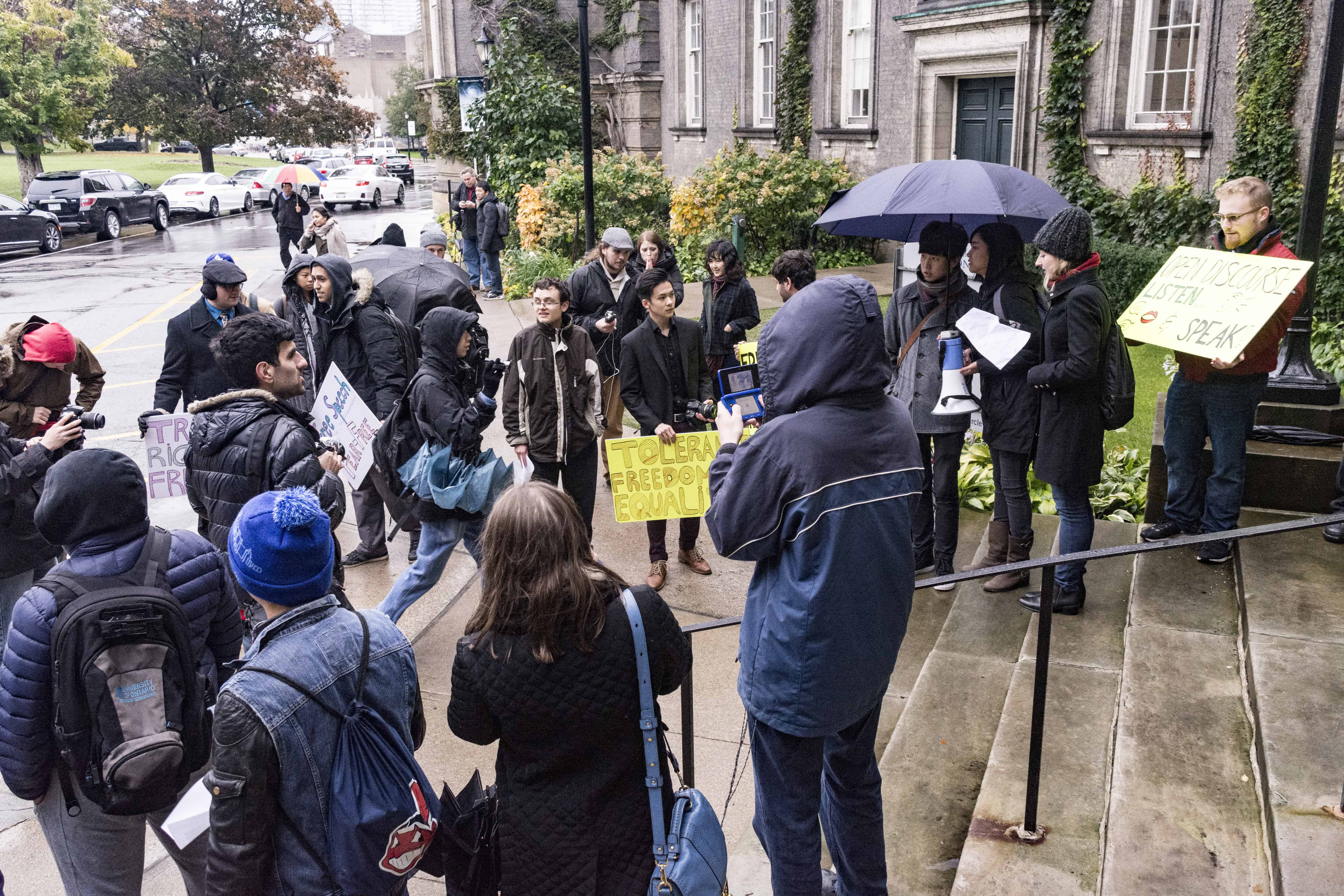On the cold and rainy afternoon of October 27, directly preceding the UTSU Annual General Meeting, a group of students organized a rally outside Simcoe Hall, where Governing Council was meeting.
The event was the second rally held on the topic of free speech following the release of the YouTube lecture series by Professor Jordan Peterson in which he outlines concerns surrounding “political correctness” and what he sees as a rising threat to the principle. The lectures have drawn responses from student unions and the administration, who have criticized some of Peterson’s statements about gender and the use of gender neutral pronouns.
One letter from the university urged the tenured professor to stop making public statements about gender in the wake of threats made against transgender students. The letter was heavily criticized by Peterson and his supporters, who saw it as an attempt to silence him.
The student organizers of the rally formed a Facebook group called ‘Students in Support of Free Speech’ (SSFS), which had over 800 members as of press time; SSFS was recognized by ULife as a student group on October 30.
The event was attended by around 60 people at its peak and did not see any of the tumult that marked the first one on October 11.
The event’s description on Facebook stated that “radical left wing activists are trying to impose censorship on our thoughts and speech, and declare a moratorium on any form of expression that THEY deem offensive.” The rally’s organizers insisted their event was apolitical.
Speaking to The Varsity, organizer Maria Morzc said that “Free speech is not a system of beliefs; it is a fundamental human right. And, also, free speech is, basically, I mean, all we want is to state our opinions without being silenced, without being labelled, without being assaulted, and we welcome members of the so-called ‘radical left.’”
Another organizer, Riley Moher, described the group as “not a libertarian group, we’re not an alt-right group, we’re not a liberal group, we just stand for the freedom of speech.”
Much of the rally followed an open mic format and did not have any featured speakers other than the organizers of the rally, unlike the October 11 event which highlighted Peterson and conservative commentator Lauren Southern.
A number of the speakers made comparisons between the university’s request that Peterson stop making public statements and totalitarianism. One speaker compared their struggle to the struggles of Chinese citizens decades ago in having to adopt the ideology of Maoism or face execution. “We’re faced [with] the idea of political correctness, with the social ostracization of us, of people who speak out against such mediocrity, against such cruelty, against such an affront to human rationality and the liberal values that Canada and America and the rest of the civilized world has been based on,” he said.
Jacob Ritchie was walking by the event when he decided to participate, and he expressed an opposing view. Speaking of Bill C-16 — a piece of legislation aimed at protecting individuals from discrimination based on gender identity and gender expression that Peterson criticizes in one of his lectures — Ritchie said to the crowd, “There’s nothing saying, like, if you go up to a guy and talk to them and you don’t use their pronouns you go to jail or you’re sectioned under the human rights law. It’s if you discriminate against them and you can go and prove that they’ve suffered a harm. And really I think there’s a much higher bar for that than you guys think there is. I think this whole thing is misguided.”
Ritchie was heckled by some attendees during his statements, but organizers ensured that he could complete his remarks. Speaking with The Varsity after his statements, Ritchie said that he thinks the whole issue of free speech has been blown out of proportion. “I don’t think there’s a problem with free speech on campus, or in Ontario, or in Canada,” he said.
Morzc said that her cause supports marginalized groups and stressed the importance of free expression to address the issues that these groups face.
“Please clear up the confusion. Because, you know, we support the LGBTQ rights and the Black rights, the rights of Black students, the rights of Black individuals in society, in general, and we recognize that they face unique challenges, and we recognize that they need to address those challenges,” she explained. “However, we believe that actually promoting freedom of speech and freedom of expression would go a long way towards actually addressing these existing problems, and stifling free speech will do the opposite.”
SSFS’s rally was supposed to culminate in a march to the UTSU AGM at OISE, but inclement weather prevented that from happening.
Editor’s note: This article has been updated to correct a typographical error in the sub-headline.


